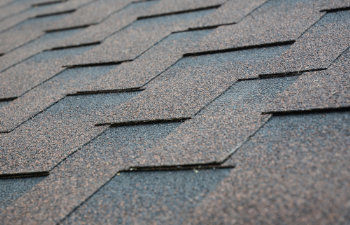
How can you help homeowners and roofing contractors weigh their options for residential roofing when deciding between composite shingles and asphalt shingles? Both offer their own set of benefits, making the decision process difficult. Mid-Atlantic Roofing Supply offers this examination to help you guide clients to the best choice.
What Are Composite Shingles?
Composite shingles, also known as synthetic shingles, are made from a mix of materials, including fiberglass, recycled materials and polymer. These shingles are designed to mimic the appearance of traditional roofing materials such as wood shakes or slate while offering the durability and performance of modern products.
Pros of Composite Shingles:
- Durability: Composite shingles are highly resistant to severe weather conditions, including hail, high winds and heavy rain. Their longevity often exceeds 30 years.
- Aesthetics: Available in various styles, colors and textures, composite shingles can provide an attractive finish that mimics the look of more expensive materials, such as wood or slate.
- Lightweight: These shingles are generally lighter than asphalt shingles, which reduces stress on the home’s structure.
- Eco-Friendly: Many composite shingles are made from recycled materials, making them an environmentally friendly option for homeowners.
- Low Maintenance: Composite shingles offer a maintenance-friendly solution, as they are resistant to rotting, warping and insect damage.
Cons of Composite Shingles:
- Cost: Composite shingles tend to be more expensive upfront compared to asphalt shingles, which may deter some budget-conscious homeowners.
- Installation: The complexity of installation might require a professional roofing contractor familiar with composite materials, potentially leading to higher labor costs.
- Expansion and Contraction: Being synthetic, they can expand or contract with extreme temperature fluctuations, which may necessitate careful installation.
What Are Asphalt Shingles?
Asphalt shingles are the most common type of roofing material used in the United States due to their affordability and effectiveness. They’re primarily made from a fiberglass or organic mat coated with asphalt and granules. There are two main types: three-tab and architectural, with the latter offering a more dimensional look.
Pros of Asphalt Shingles:
- Affordability: Asphalt shingles are generally less expensive than composite shingles, making them a more attractive option for budget-conscious homeowners.
- Variety: Available in multiple colors, textures and styles, asphalt shingles offer a wide range of aesthetic choices.
- Ease of Installation: Their simplicity facilitates quicker installation, resulting in reduced labor costs.
- Good Performance: Asphalt shingles provide decent weather resistance and can last anywhere from 15 to 30 years, depending on the quality.
- Widely Available: Being a well-known roofing material, asphalt shingles are widely available in most home improvement stores.
Cons of Asphalt Shingles:
- Shorter Lifespan: Compared to composite shingles, asphalt shingles generally have a shorter lifespan and may require replacement sooner.
- Less Durability: They can be more susceptible to damage from high winds and relentless sun exposure.
- Mold and Algae Growth: Over time, asphalt shingles can develop mold and algae, particularly in humid environments, which can affect their appearance.
- Weight: Although lighter than some roofing materials, asphalt shingles can still be heavier than composite panels, which necessitate structural considerations.
- Environmental Impact: Most asphalt shingles are not eco-friendly, as they are made from petroleum-based materials and may not be recyclable.
Making the Choice
When weighing composite versus asphalt shingles, your decision should take into account several key factors, including budget, desired aesthetic, performance expectations and longevity.
- Budget: If cost is your main concern, asphalt shingles offer an affordable entry point. However, if you’re looking for long-term value and are willing to invest more upfront, composite shingles may be the better choice.
- Aesthetics: For homeowners who prioritize curb appeal, composite shingles can offer a more upscale appearance that reflects your personal style choices.
- Longevity and Maintenance: If you prefer a roof that requires fewer repairs and maintenance, composite shingles are a worthwhile consideration.
Roofing FAQs
How long do shingles last?
Asphalt shingles can last 15 to 30 years, while composite shingles typically last 30 years or more, depending on the brand and quality.
Are composite shingles better than asphalt shingles?
It depends on your priorities. Composite shingles provide better longevity and aesthetic options, while asphalt shingles are more affordable and easier to install.
Do I need to worry about algae growth on asphalt shingles?
Yes, asphalt shingles can develop algae and mold over time, particularly in humid climates. Opt for algae-resistant shingles if this is a concern.
Is professional installation necessary?
For both types of shingles, professional installation is recommended to ensure proper fit, alignment and warranty coverage.
Can I install new shingles over old shingles?
In many cases, it is possible to install new shingles over existing ones, but local building codes and the condition of the old roof should be assessed.
Wholesale Residential Roofing Material Distributor
Both composite and asphalt shingles have their unique benefits and drawbacks. The ultimate choice comes down to a client’s personal preferences, budget and specific needs. By understanding the differences between these materials, you can help clients make an informed and effective roofing investment.
Contact Mid-Atlantic Roofing Supply to learn more about sourcing top-quality shingles and other residential and commercial roofing products at wholesale prices for your local roofing and builder supply store.
Posted on behalf of